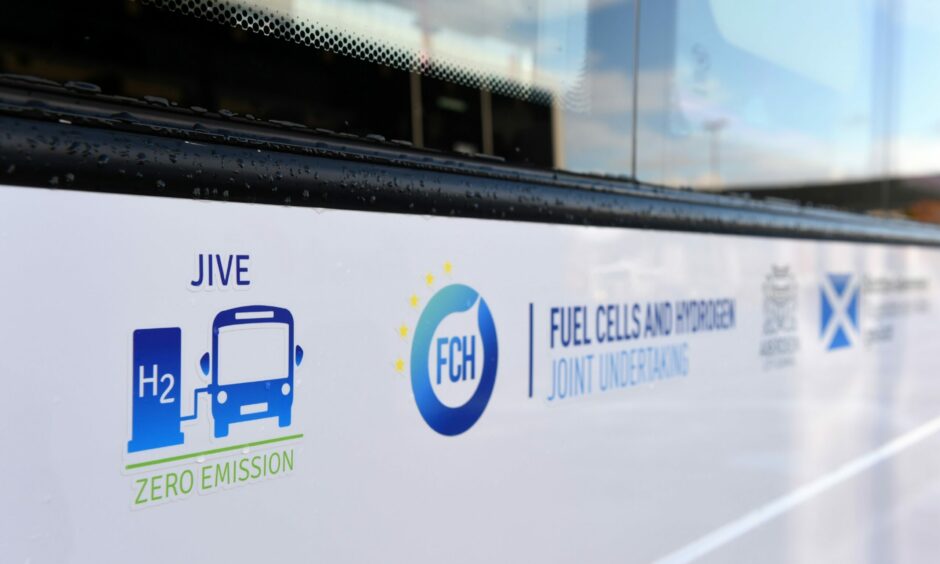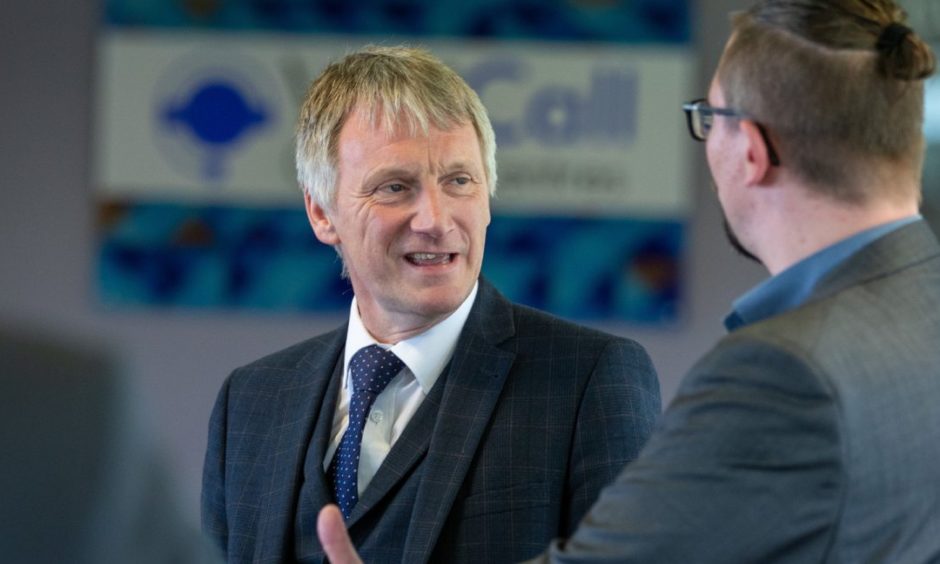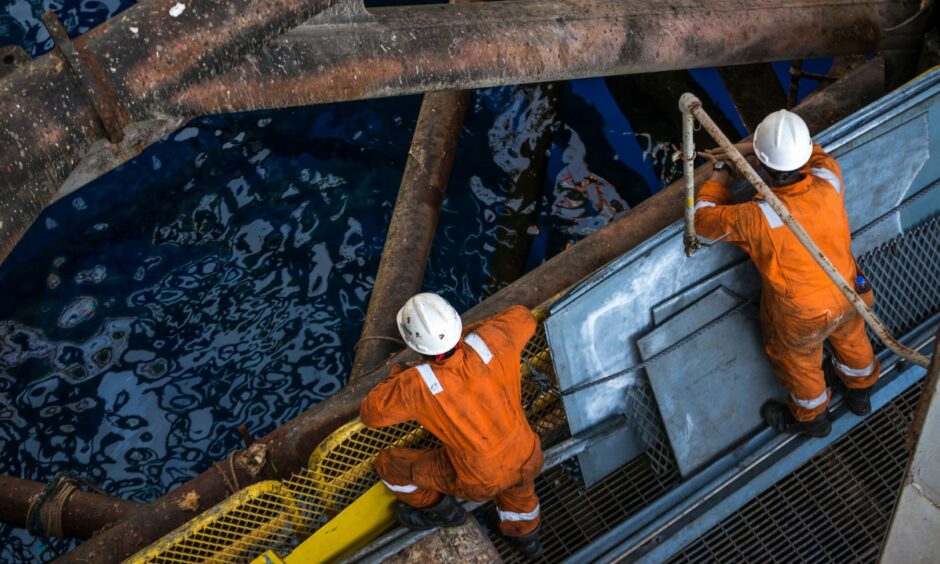
As the world debated climate change at Cop26, Nicola Sturgeon wined and dined oil and gas giants at Edinburgh Castle.
It is one of more than 100 meetings unearthed by an investigation into the huge lobbying operation by fossil fuel interests pushing what campaigners describe as expensive and inefficient hydrogen technology in Scotland.
More than 30 meetings took place between oil and gas companies and MSPs where hydrogen was discussed between the 2021 Holyrood election and the end of last year.
A further 70 meetings were held with companies who stood to benefit from the roll out of hydrogen technology.
Greenwashing accusations
Activists have accused the Scottish Government of “doing the greenwashing job” for energy giants by classifying blue hydrogen, where the product is derived from fossil fuels, as a low carbon option.
They claim the SNP’s Hydrogen Action Plan is a way of “sneaking fossil fuels in by the back door” because green hydrogen, which is created by splitting water using electricity from renewables such as wind turbines or solar panels, remains too expensive.
Despite being more combustible and leakier than natural gas, energy firms have insisted that hydrogen can be made safe.
The Scottish Government has pledged over £100 million in handouts to the industry but has so far refused to set out how much of its pledged 5GW of hydrogen capacity by 2030 will be generated from fossil fuel use.
At one meeting, with then Energy Minister Paul Wheelhouse in January 2021, the official record states Shell specifically “emphasized the importance” of both green and blue hydrogen in Scotland.
Cop26 dinner with Nicola Sturgeon
On the day the government published its draft Hydrogen Action Plan at Cop26, it organised a lavish dinner at Edinburgh Castle with 52 industry lobbyists.
The bash was attended by BP, INEOS, Shell, Wood Group and Offshore Energies UK.
It was hosted by Business Minister Ivan McKee and attended by then First Minister Nicola Sturgeon.
In another instance in May 2022, Michael Matheson – who was at the time Cabinet Secretary for Net Zero – travelled to Rotterdam to speak at the World Hydrogen Summit.
It markets itself as the global platform where hydrogen deals get done.
The two-day conference had host partners BP and Shell, and diamond sponsorship from Saudi oil company Aramco and the Abu Dhabi National Oil Company.
‘Targeted push’ by fossil fuel firms
Campaigners say the meetings demonstrate the huge push by energy giants such as BP and Shell – who met MSPs 17 and nine times respectively.
Friends of the Earth Scotland climate campaigner Alex Lee said: “Hydrogen lobbyists have made a targeted push trying to persuade the Scottish Government to ignore the mounting evidence about the technology’s inefficiency and huge costs.
“By incorrectly classifying hydrogen from fossil fuels as low carbon, Scottish Ministers are doing the greenwashing job for fossil fuel companies.
“Big polluters like Shell and BP are selling hydrogen hard because it allows them to keep on drilling for fossil fuels and keep the public locked into an energy system using oil and gas for decades to come.
“The Scottish Government has been taken in by the marketing hype around hydrogen, promising over £100 million of public money to the industry and repeating outlandish jobs creation claims.
“Ministers must end their support for hydrogen from fossil fuels and instead use renewable power directly in heating and transport rather than wasting time and energy by converting it to hydrogen first.”
The more than 100 meetings with MSPs including those where oil and gas companies advocated for hydrogen, meetings requested by hydrogen-specialist companies, and industry events with the purpose of promoting hydrogen.
It is not clear to what extent the meetings focused on green or blue hydrogen use.
Due to a loophole in the lobbying register, meetings called by the ministers themselves are not registered.
Meetings that took place over the phone or on videocall with the cameras turned off are also not recorded.
Additional meetings were found through examination of ministerial diaries.
Hydrogen ‘not a silver bullet’
A 2022 report commissioned by Friends of the Earth Scotland found 98% of global hydrogen production comes from fossil fuels.
It also noted inefficiencies, soaring costs and the threat hydrogen poses to renewable energy supplies.
A leading expert told us hydrogen is far from a “silver bullet” for Scotland’s fuel needs and will fail to provide a large number of new jobs.
Tom Baxter, a visiting professor in chemical engineering at Strathclyde University, said it could prove more costly for homeowners and unsuitable for most business needs.
Mr Baxter noted hydrogen is “not energy efficient” but is popular with big players already in the industry because high costs mean it will be largely be derived from fossil fuels for the next decade or more.
Meanwhile, gas grid operators and gas boiler manufacturers see hydrogen as a survival route as fossil fuel burning is phased out.
Mr Baxter predicts hydrogen will have limited use in transport and haulage and no place in farming outside of some agricultural vehicles.
He said: “Heating our homes with hydrogen is touted by many as a good use for hydrogen.
“Hydrogen will be more expensive than natural gas or electricity and will push more families into fuel poverty.”
Mr Baxter said hydrogen will have a role in Scotland’s energy future but it will be minor.
He added: “It is not a silver bullet nor a large job creator.”
What does the government say?
A Scottish Government spokesman said: “Hydrogen technology has tremendous potential to help deliver a just transition for our energy sector, realising huge economic benefits while supporting our net zero transformation.”
He added: “Ministers undertake a wide range of stakeholder engagements relevant to their portfolio areas and energy ministers meet with businesses, owners and operators in the sector as a matter of course.
“Our focus must be meeting our energy security needs, reducing emissions and ensuring a just transition for our oil and gas workforce and supply chain as North Sea resources decline.”
Mike Gaskill, head of external affairs at Offshore Energies UK said: “MSPs and officials consult industry experts from all sectors to help them make good policy.
“This is a key part of the process of democratic government and transparent policymaking.
“Businesses and academics from all industries and third sector representatives should be encouraged to engage with policymakers to ensure they are well informed and able to make policies and investments that benefit people and support jobs across Scotland and the UK.”

Enjoy the convenience of having The Sunday Post delivered as a digital ePaper straight to your smartphone, tablet or computer.
Subscribe for only £5.49 a month and enjoy all the benefits of the printed paper as a digital replica.
Subscribe



